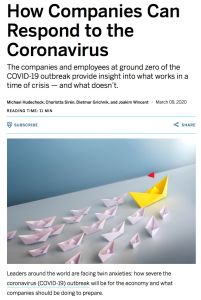Join getAbstract to access the summary!

Join getAbstract to access the summary!
Michael Hudecheck, Charlotta Sirén, Dietmar Grichnik and Joakim Wincent
How Companies Can Respond to the Coronavirus
The companies and employees at ground zero of the COVID-19 outbreak provide insight into what works in a time of crisis — and what doesn’t.
MIT Sloan Management Review, 2020
What's inside?
Businesses can learn from China’s experience coping with the economic fallout of the COVID-19 crisis.
Recommendation
As the world faces the coronavirus pandemic’s impact on business and the economy, companies coping with the economic fallout in China offer worthwhile, applicable lessons. European university-based researchers developed a set of best practices derived from the Chinese experience, and summed them up in the MIT Sloan Management Review. Their findings offer a helpful starting point for business leaders adjusting to this new reality.
Take-Aways
- The COVID-19 outbreak and government-mandated mitigation measures are severely disrupting the Chinese economy.
- Companies facing the Corona outbreak must prepare their workforce early for telecommuting.
- Organizations must take precautions to ease the financial impact and supply chain disruption of virus-related lockdowns.
- Corporate leaders should help ease the suffering in their communities.
Summary
The COVID-19 outbreak and government-mandated mitigation measures have had a severe impact on the Chinese economy.
The Global Center for Entrepreneurship and Innovation at the University of St. Gallen in Switzerland analyzed satellite data on air pollution emissions. They sought to identify changes in manufacturing activity in those parts of China most affected by the virus outbreak. The areas nearest the epicenter of the pandemic showed the greatest reduction in emissions.
In the industrial areas around Wuhan City, emissions dropped by up to 85%. Average emissions reductions across China between January 24 – when mandated quarantines began in Hubei Province – and February 21, 2020 were 38%.
“Managers lack clear guidance on how to ready their organizations for a global pandemic event.”
That drop in activity translates into at least $215.6 billion in losses for the manufacturing sector. This does not reflect the pandemic’s impact on other Chinese businesses nor losses incurred moving up supply chains as sourcing companies struggle to find alternate suppliers and fall behind on production schedules.
Companies facing the Corona outbreak must prepare their workforce early for telecommuting.
Chinese companies coping with COVID-19 offer touchstones for developing a set of best practices for managing this crisis. One is to prepare a smooth transition to telecommuting for workers who can do their jobs off-site. Encourage employees to start telecommuting early to help them adjust before remote work becomes mandatory. An early start can nourish your firm’s development of the information and infrastructure it needs to support telecommuting.
“Use techniques from scenario planning to generate ideas about how your company could pull together the capacity to resume operations in even a limited form.”
Train leaders to set realistic expectations about remote workers’ availability; limit it to standard working hours. First identify employees who are crucial to maintaining necessary, if partial, operations, then build a plan to support them. Make sure they have all requisite resources in case of a complete shutdown in their area.
Organizations must take precautions to ease the financial impact and supply chain disruption of virus-related lockdowns.
Anticipate “operational shocks” and take necessary precautions. Small- and medium-sized enterprises (SMEs) face the danger of running out of cash quickly. SMEs should keep at least one to three months of cash on hand to pay salaries and debts.
“The middle of a crisis is the worst time to be scrambling for the basics of operations.”
Research options for securing short-term loans, which in some areas are available through government relief programs. Find out if you can extend the terms of current loans. Fill your reserves of essential supplies and parts, consult with suppliers about their situations and seek alternative suppliers from nations hit less hard by the virus.
Corporate leaders should find ways to help ease the suffering in their communities.
Companies that help their communities in times of crisis are responding to a worthy moral imperative while contributing to their own long-term viability. Firms that engage in charitable activities perform better in the long term, maintain enhanced relations with government authorities and gain a more positive public image.
Companies in areas that anticipate a powerful outbreak can perform necessary groundwork now by establishing dialogue with their community and local non-profit organizations. Make support available in your area. In China, for example, the Alibaba Group set up a $144 million fund to help Hubei Province hospitals buy medical supplies.
“Companies that recognize the stress on social systems during medical emergencies are more likely to do better afterward than companies that do not.”
Support your employees’ volunteer activities and make donations. In a succinct and matter-of-fact way, let the public know what you have done, but don’t brag. In China, companies that reached out to their communities at the start of the crisis earned a palpable positive reputational impact in traditional and social media.
This crisis is a harbinger of a “new reality,” in which epidemics and other ecological traumas threaten commercial operations worldwide. Swift, thoughtful action can help make your organization more resilient.
About the Authors
Michael Hudecheck of Switzerland’s University of St. Gallen; Charlotta Sirén of Brisbane’s University of Queensland; Dietmar Grichnik of St. Gallen’s Institute of Technology Management; and Joakim Wincent, a professor at St. Gallen and at Helsinki’s Hanken School of Economics all conduct research on entrepreneurship.
This document is restricted to personal use only.


















Comment on this summary